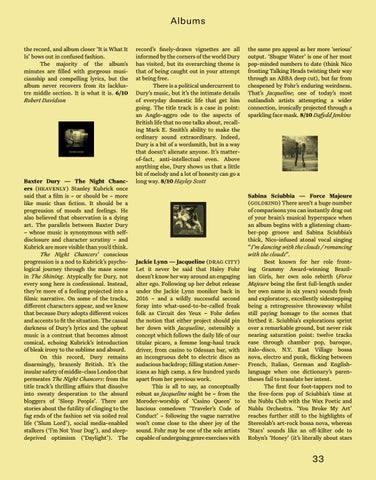Albums the record, and album closer ‘It is What It Is’ bows out in confused fashion. The majority of the album’s minutes are filled with gorgeous musicianship and compelling lyrics, but the album never recovers from its lacklustre middle section. It is what it is. 6/10 Robert Davidson
Baxter Dury — The Night Chancers (heavenly) Stanley Kubrick once said that a film is – or should be – more like music than fiction. It should be a progression of moods and feelings. He also believed that observation is a dying art. The parallels between Baxter Dury – whose music is synonymous with selfdisclosure and character scrutiny – and Kubrick are more visible than you’d think. The Night Chancers’ conscious progression is a nod to Kubrick’s psychological journey through the maze scene in The Shining. Atypically for Dury, not every song here is confessional. Instead, they’re more of a feeling projected into a filmic narrative. On some of the tracks, different characters appear, and we know that because Dury adopts different voices and accents to fit the situation. The casual darkness of Dury’s lyrics and the upbeat music is a contrast that becomes almost comical, echoing Kubrick’s introduction of bleak irony to the sublime and absurd. On this record, Dury remains disarmingly, brazenly British. It’s the insular safety of middle-class London that permeates The Night Chancers: from the title track’s thrilling affairs that dissolve into sweaty desperation to the absurd bloggers of ‘Sleep People’. There are stories about the futility of clinging to the fag ends of the fashion set via soiled real life (‘Slum Lord’), social media-enabled stalkers (‘I’m Not Your Dog’), and sleepdeprived optimism (‘Daylight’). The
record’s finely-drawn vignettes are all informed by the corners of the world Dury has visited, but its overarching theme is that of being caught out in your attempt at being free. There is a political undercurrent to Dury’s music, but it’s the intimate details of everyday domestic life that get him going. The title track is a case in point: an Anglo-aggro ode to the aspects of British life that no one talks about, recalling Mark E. Smith’s ability to make the ordinary sound extraordinary. Indeed, Dury is a bit of a wordsmith, but in a way that doesn’t alienate anyone. It’s matterof-fact, anti-intellectual even. Above anything else, Dury shows us that a little bit of melody and a lot of honesty can go a long way. 8/10 Hayley Scott
Jackie Lynn — Jacqueline (drag city) Let it never be said that Haley Fohr doesn’t know her way around an engaging alter ego. Following up her debut release under the Jackie Lynn moniker back in 2016 – and a wildly successful second foray into what-used-to-be-called freak folk as Circuit des Yeux – Fohr defies the notion that either project should pin her down with Jacqueline, ostensibly a concept which follows the daily life of our titular picaro, a femme long-haul truck driver, from casino to Odessan bar, with an incongruous debt to electric disco as audacious backdrop; filling station Americana as high camp, a few hundred yards apart from her previous work. This is all to say, as conceptually robust as Jacqueline might be – from the Moroder-worship of ‘Casino Queen’ to luscious comedown ‘Traveler’s Code of Conduct’ – following the vague narrative won’t come close to the sheer joy of the sound. Fohr may be one of the sole artists capable of undergoing genre exercises with
the same pro appeal as her more ‘serious’ output. ‘Shugar Water’ is one of her most pop-minded numbers to date (think Nico fronting Talking Heads twisting their way through an ABBA deep cut), but far from cheapened by Fohr’s enduring weirdness. That’s Jacqueline; one of today’s most outlandish artists attempting a wider connection, ironically projected through a sparkling face mask. 8/10 Dafydd Jenkins
Sabina Sciubbia — Force Majeure (goldkind) There aren’t a huge number of comparisons you can instantly drag out of your brain’s musical hyperspace when an album begins with a glistening chamber-pop groove and Sabina Sciubbia’s thick, Nico-infused atonal vocal singing “I’m dancing with the clouds / romancing with the clouds”. Best known for her role fronting Grammy Award-winning Brazilian Girls, her own solo rebirth (Force Majeure being the first full-length under her own name in six years) sounds fresh and exploratory, excellently sidestepping being a retrogressive throwaway whilst still paying homage to the scenes that birthed it. Sciubbia’s explorations sprint over a remarkable ground, but never risk nearing saturation point: twelve tracks ease through chamber pop, baroque, italo-disco, N.Y. East Village bossa nova, electro and punk, flicking between French, Italian, German and Englishlanguage when one dictionary’s parentheses fail to translate her intent. The first four foot-tappers nod to the free-form pop of Sciubbia’s time at the Nublu Club with the Wax Poetic and Nublu Orchestra. ‘You Broke My Art’ reaches further still to the highlights of Stereolab’s art-rock bossa nova, whereas ‘Stars’ sounds like an off-kilter ode to Robyn’s ‘Honey’ (it’s literally about stars
33
